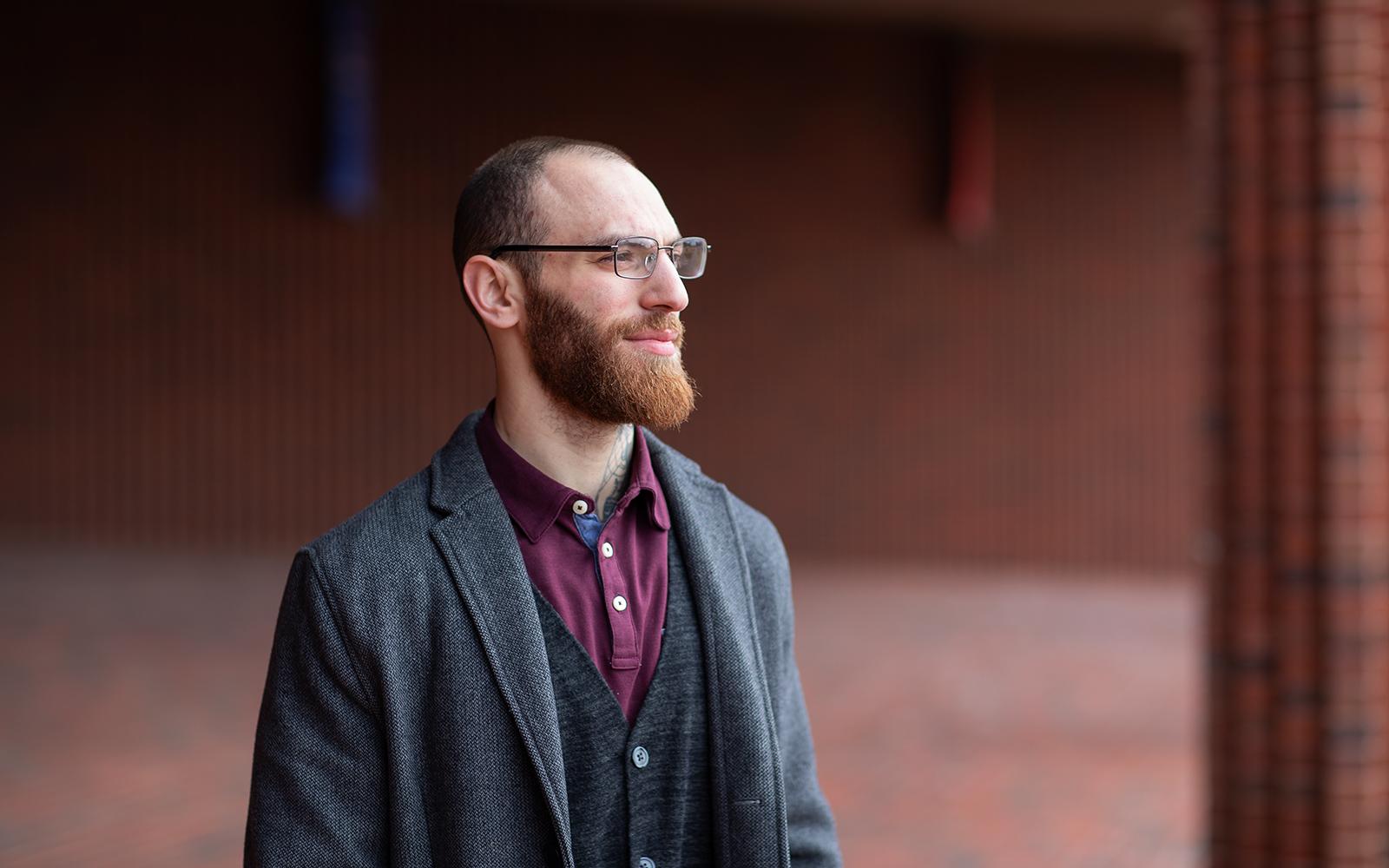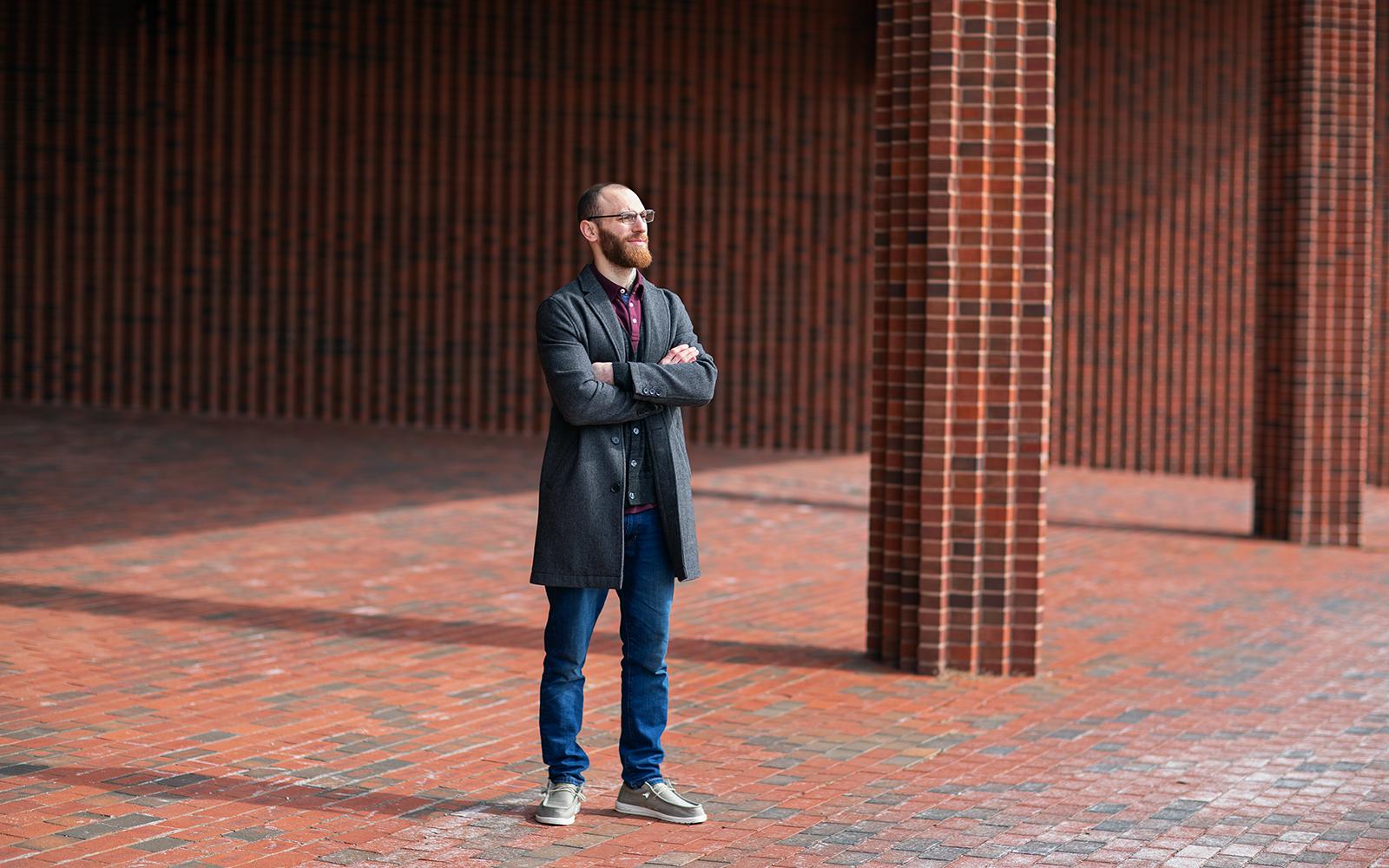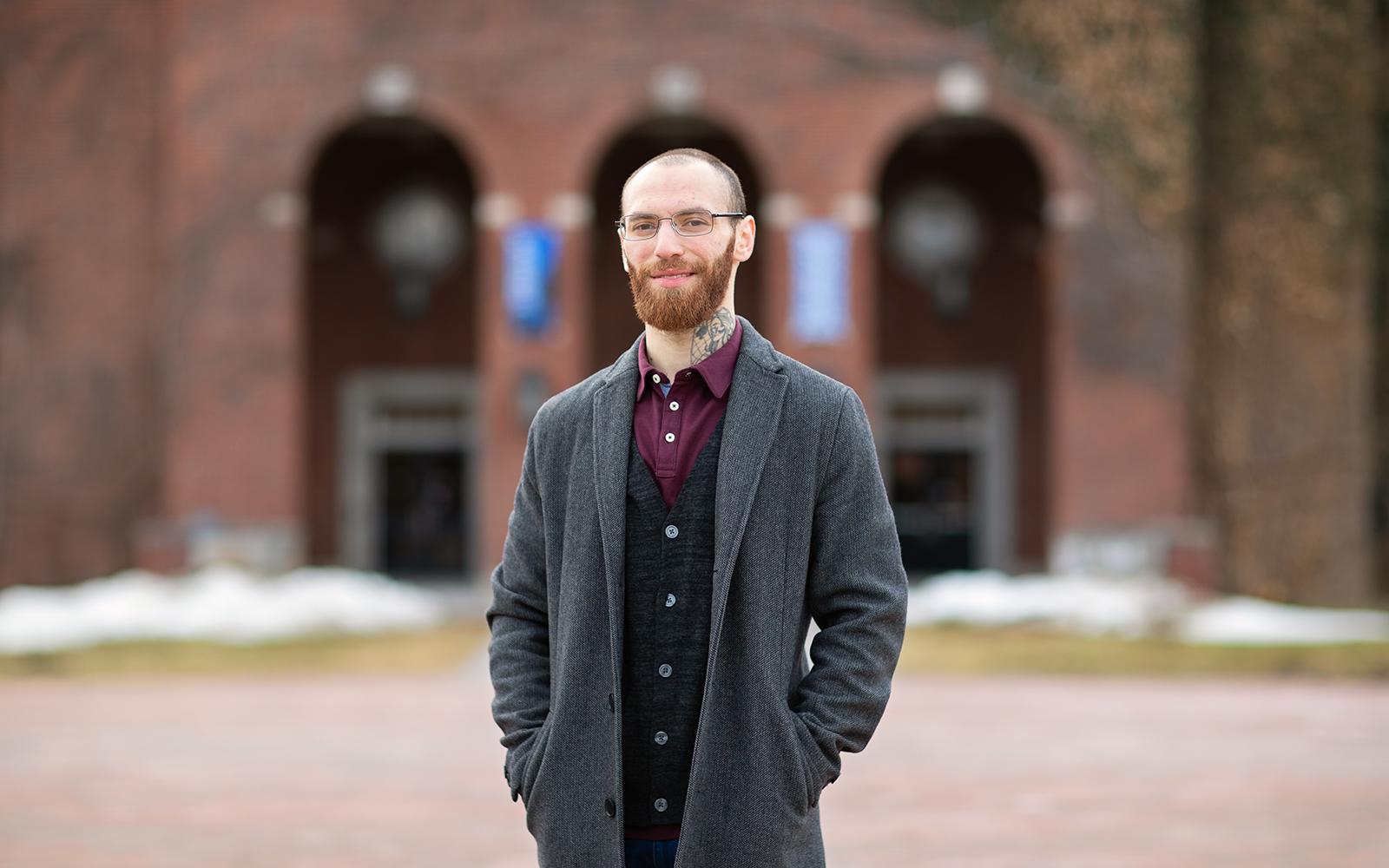Inside an elaborate series of barbed wire fences, guard towers, and carefully monitored living quarters, Brandon Rodriguez '24 counted down his days to freedom.
Serving time in the Ogdensburg Correctional Facility (OCF), Rodriguez turned to education to free his mind. After long shifts in the mess hall preparing breakfast and lunch for his fellow inmates, he retreated to the solitude of the law library where he fueled his desire for knowledge.
“Once I was mentally stimulated in there, it was like somebody giving you a key to freedom,” he said. “I worked in the law library diligently. I made it my job. I was there every day, for eight hours.”

Building Knowledge
As he learned how to file an appeal for his case, he formed a friendship with another inmate, a former attorney and accountant, who gave Rodriguez valuable feedback about a brief he was preparing. “This looks like it was prepared by an entry-level attorney, somebody with actual experience,” Rodriguez recalled him saying.
The encouragement bolstered his confidence and led him to seek additional educational opportunities. He found an old book in the library listing college addresses and phone numbers, so, he typed up a letter, and sent it to 150 different schools inquiring about distance learning options.
His only lead, a letter from North Country Community College (NCCC), informed him that their distance learning options were on hold during the pandemic, but the letter also provided details about SUNY Potsdam’s new sociology program that was in its final stages of development at the Riverview Correctional Facility (RCF).
The Potsdam at RCF program was just rolling out, offering inmates a path to receive their bachelor’s degree through the federally funded Second Chance Pell Grant. Eligible inmates were invited to a meeting to learn more about the program, but unfortunately, Rodriguez didn’t meet the criteria. After the meeting, he saw Anthony Rufa, the education supervisor at RCF in the hallway. “I was like, ‘This is my chance. I’m risking being out of place by approaching a civilian, this is just a bad situation, but I have to get into college.’ So, I ran up to Mr. Rufa [to express my interest in the program], and he said, ‘No if you’re not on the list you’re not eligible. You must have at least two more years left in prison.’ At the time I only had one year and eight months left,” Rodriguez recalled.
Then he remembered the letter he had received from NCCC, listing Dr. Nancy Lewis, a sociology professor at SUNY Potsdam, as the main contact for the program. So, he penned her a letter expressing his interest. It made an impact, and Lewis pulled some strings to get him into the new program.
A month later, Rodriguez was transferred to the RCF, just before classes began. He immediately enrolled in an English and communications class with Dr. Trevor Blank, a theatre class with Rivka Eckert, and a biology class with Dr. Kate Cleary examining zoonotic diseases. “The first semester was incredible. Everybody was helping each other out. I believe that first semester, 13 or 14 people made the President’s List,” he said. “They were throwing things at us that I had never heard of, and it was just what I wanted.”
The second semester, Rodriguez took core classes for his sociology degree, including Introduction to Criminal Justice, and Sociology of Mental Health. He worked closely with Dr. Lewis, who proved to be his greatest mentor. “I can’t even find words. She’s a force. She’s done so many things for me and the program,” he said. “I would look forward to her coming into the prison, just to have a conversation with her, to see how she’s doing and see how things were building in the program.”
One of the top students in the program, Rodriguez worked with Lewis to form an academic enrichment committee, helping to open lines of communication between corrections officers, faculty, and students. The committee was able to get a whiteboard for students to use in their housing unit, allowing them to discuss topics from their courses in study groups, without having to go back to the education center.
“The sociology program has been really good because you can be reflective on your social background, where you come from, and how it relates to the system. You can reflect on that introspectively and understand, ‘Wow there were a lot of forces stacked against where I’m from,” he said. “I started selling drugs when I was young. I also sold guns when I was older. The environmental influences had a big impact, and I believe that if I grew up in different circumstances, I would have seen better opportunities, but of course, I made horrible choices to end up in prison.”

Trouble with the Law
Raised by a single mother in Brooklyn, N.Y., Rodriguez had the deck stacked against him from a young age. His mother was dealing with the physical and mental side effects of multiple sclerosis, including depression, which made it difficult for her to effectively provide for her son. “She couldn’t walk or drive by the time I was 12 years old. It was hard. To keep up with everything, I started selling drugs. She was getting disability, which was around $800 per month, but it was tough, we didn’t have food.”
When he traveled from Brooklyn to Queens to attend Scholars’ Academy every day, he witnessed a stark contrast between life at school and his situation back home. “There were economic disparities between where I went to school and my home. I went over to friends’ houses, and they lived on beachfront properties on Rockaway Beach, and a lot of my peers at the school had a lot of money. That was one of those moments when I realized, ‘Wow, we’re in a bad spot,’” he said.
Rodriguez started selling drugs in middle school, and continued throughout high school until he was arrested. When he was released, he tried to turn his life around. At 19, he enrolled in a construction management and civil engineering program at New York City College of Technology, landed a full-time job installing custom glass at buildings throughout Manhattan, and welcomed a daughter into the world. But he was still on parole and was required to meet with a parole officer at designated times.
“I went to college for a short period of time, until I got in trouble with probation. There were stipulations with probation and parole, and it didn’t matter if you were attending college or working, if they told you to come on a specific date, you had to come on that date. They recently passed a law changing that. But I was on financial aid, I was working, I had a daughter, and I couldn’t go,” Rodriguez explained.
He was summoned to court for the parole violation where he presented his class schedules, letters from professors, and time sheets from work, but unfortunately, it wasn’t enough. The judge was unyielding in his decision and sentenced him to a year at Rikers Island, New York City’s largest jail notoriously known for its violence. “The court bailiff—I won’t forget this, either—he said, ‘I’ve never seen anything like that,’” Rodriguez said, referring to the harsh sentencing.
He missed his daughter’s first birthday, and when he was released a year later, he struggled to get back on the right track. “There was no reintegration, especially on Rikers Island. There were no programs,” he said. “I tried to get back to work, but that didn’t really work out. I started to see that people denied me for my criminal background, and I ended up going back to selling drugs. That’s when I ended up selling arms as well. I was like, ‘You know what, if I’m a criminal now, I might as well just be a criminal. It was a bad mentality to have. It was horrible.”
On his way to visit his grandmother one day, he was pulled over during a routine traffic stop. The police found drugs and a loaded firearm in his car. He was taken into custody on charges of criminal possession of a weapon and criminal possession of a controlled substance. “When I got arrested, I told myself immediately, ‘That’s it, I’m not selling drugs anymore,’” he said.
Rodriguez was out on bail for two years, but decided not to go to trial, and instead accept a plea deal that sent him to prison for three and a half years. After short stints downstate, he was sent to Ogdensburg, N.Y., where he spent his sentence behind bars at OCF and RCF.

Redemption through Education
In the fall of 2021, with Rodriguez halfway through his sentence, he had the opportunity to pursue a bachelor’s degree in sociology through SUNY Potsdam’s new program at RCF.
For the next year and a half, he poured all his energy into his academics—becoming a leader for other inmates in the program as a tutor, and a teaching assistant in several classes. “We created this academic culture that was a stark contrast from any other prison unit I’d ever been in. I would be at this end of the unit and then somebody would be like, ‘Oh man, when you’re done, come help me over here.’ I was helping everybody with writing, reading and statistics. It was great,” he said.As part of an Introduction to Anthropology course with Dr. Alan Hersker, interim provost at SUNY Potsdam, he was able to reflect on his time in prison through one of his assignments.
“I ended up writing a short ethnography about my time at Riverview Correctional Facility and specifically my time in the program. You’re given all these tools to reflect on your current circumstances. I was so grateful for that.”
In January 2023, Rodriguez was released from prison, and rather than return home to New York City, he remained in Northern New York to finish his degree at SUNY Potsdam. Dr. Blank met him outside the prison the moment he stepped outside as a free man and gave him a ride to Potsdam. Dr. Lewis helped him secure housing and connected him with the Unitarian Universalist Church in Canton, which provided him with financial support for the security deposit at his new apartment. He also met up with Dr. Blair Madore, a professor in the mathematics department, who took him for a hike during his first day out of prison.
“It’s been great. I took a little time to feel comfortable in my own skin again. It’s funny to look back at how uncomfortable I was those first couple of weeks. I still am uncomfortable in certain ways, and in other ways, I’ve changed and I’ve grown,” he said.
During the Spring 2023 semester, Rodriguez attended classes in person at SUNY Potsdam, with a completely different cohort of students. With one year left in the program, he has been lining up hands-on learning opportunities, like an internship with the Ford Foundation this summer in New York City. After two interviews with a panel of employees at the company, he was offered an internship with the Gender, Racial, and Ethnic Justice team, which, among other things, focuses on issues of mass incarceration. “They’re the philanthropic arm of Ford, a global charity. They work with smaller non-profits and fund them. I’ll be working with them, probably in grant writing for these smaller foundations,” he said.
After he graduates in the Spring of 2024, Rodriguez plans on attending law school and building on the skills he’s acquired from his professors at SUNY Potsdam as he helps people navigate the judicial system. “Education is empowering, and knowledge is empowering,” he said. “I’ve had a bunch of mentors who are incredible people and I’ve been given some great opportunities.”
Article and photos by Jason Hunter
